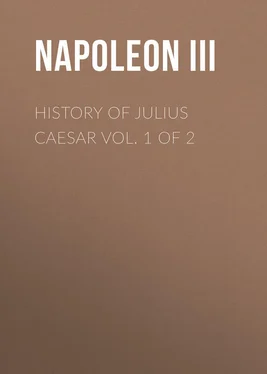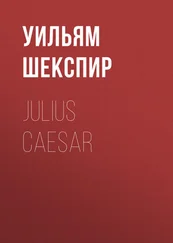Napoleon III - History of Julius Caesar Vol. 1 of 2
Здесь есть возможность читать онлайн «Napoleon III - History of Julius Caesar Vol. 1 of 2» — ознакомительный отрывок электронной книги совершенно бесплатно, а после прочтения отрывка купить полную версию. В некоторых случаях можно слушать аудио, скачать через торрент в формате fb2 и присутствует краткое содержание. Жанр: foreign_antique, foreign_prose, Биографии и Мемуары, на английском языке. Описание произведения, (предисловие) а так же отзывы посетителей доступны на портале библиотеки ЛибКат.
- Название:History of Julius Caesar Vol. 1 of 2
- Автор:
- Жанр:
- Год:неизвестен
- ISBN:нет данных
- Рейтинг книги:5 / 5. Голосов: 1
-
Избранное:Добавить в избранное
- Отзывы:
-
Ваша оценка:
- 100
- 1
- 2
- 3
- 4
- 5
History of Julius Caesar Vol. 1 of 2: краткое содержание, описание и аннотация
Предлагаем к чтению аннотацию, описание, краткое содержание или предисловие (зависит от того, что написал сам автор книги «History of Julius Caesar Vol. 1 of 2»). Если вы не нашли необходимую информацию о книге — напишите в комментариях, мы постараемся отыскать её.
History of Julius Caesar Vol. 1 of 2 — читать онлайн ознакомительный отрывок
Ниже представлен текст книги, разбитый по страницам. Система сохранения места последней прочитанной страницы, позволяет с удобством читать онлайн бесплатно книгу «History of Julius Caesar Vol. 1 of 2», без необходимости каждый раз заново искать на чём Вы остановились. Поставьте закладку, и сможете в любой момент перейти на страницу, на которой закончили чтение.
Интервал:
Закладка:
Electoral Corruption. – Fraud found its way into the elections as soon as the number of electors increased and rendered it necessary to collect more suffrages to obtain public charges; as early as 396, indeed, a law on solicitation, proposed by the tribune of the people, C. Pœtelius, bears witness to the existence of electoral corruption.
Law of High-treason. – As early as 305 and 369, the application of the law of perduellio, or design against the Republic, furnished to arbitrary power an arm of which, at a later period, under the emperors, so deplorable a use was made under the name of the law of high-treason. 122 122 “Appius convokes an assembly, accuses Valerius and Horatius of the crime of perduellio, calculating entirely on the tribunian power with which he was invested.” (Year of Rome 305.) (Dionysius of Halicarnassus, XI. 39.)
Slavery. – Slavery presented serious dangers for society, for, on the one hand, it tended, by the lower price of manual labour, to substitute itself for the labour of free men; while, on the other, discontented with their lot, the slaves were always ready to shake off the yoke and become the auxiliaries of all who were ambitious. In 253, 294, and 336, partial insurrections announced the condition already to be feared of a class disinherited of all the advantages, though intimately bound up with all the wants, of ordinary life. 123 123 “In the interim, there was at Rome a conspiracy of several slaves, who formed together the design of seizing the forts and setting fire to the different quarters of the town.” (Year of Rome 253.) (Dionysius of Halicarnassus, V. 51.) – “From the summit of the Capitol, Herdonius called the slaves to liberty. He had taken up the cause of misfortune; he had just restored to their country those whom injustice had banished, and delivered the slaves from a heavy yoke; it is to the Roman people that he wishes to give the honour of this enterprise.” (Year of Rome 294.) (Titus Livius, III. 15.) – “The slaves who had entered into the conspiracy were, at different points, to set fire to the town, and, while the people were occupied in carrying assistance to the houses which were in flames, to seize by force of arms the citadel and the Capitol. Jupiter baffled these criminal designs. On the denunciation of two slaves, the guilty were arrested and punished.” (Year of Rome 336.) (Titus Livius, IV. 45.)
The number of slaves increased rapidly. They replaced the free men torn by the continual wars from the cultivation of the land. At a later period, when these latter returned to their homes, the Senate was obliged to support them by sending as far as Sicily to seek wheat to deliver to them either gratis or at a reduced price. 124 124 “Finally, under the consulship of M. Minucius and A. Sempronius, wheat arrived in abundance from Sicily, and the Senate deliberated on the price at which it must be delivered to the citizens.” (Year of Rome 263.) (Titus Livius, II. 34.) – “As the want of cultivators gave rise to the fear of a famine, people were sent to search for wheat in Etruria, in the Pomptinum, at Cumæ, and even as far as Sicily.” (Year of Rome 321.) (Titus Livius, IV. 25.)
Agrarian Laws. – As to the Agrarian laws and the question of debts, they soon became an incessant cause of agitation.
The kings, with the conquered lands, had formed a domain of the State ( ager publicus ), one of its principal resources, 125 125 “When Romulus had distributed all the people in tribes and curiæ, he also divided the lands into thirty equal portions, of which he gave one to each curia, reserving, nevertheless, what was necessary for the temples and the sacrifices, and a certain portion for the domain of the Republic .” (Dionysius of Halicarnassus, II. 7.)
and generously distributed part of it to the poor citizens. 126 126 “Numa distributed to the poorest of the plebeians the lands which Romulus had conquered and a small portion of the lands of the public domain.” (Dionysius of Halicarnassus, II. 62.) – “ Similar measures are attributed to Tullius Hostilius and Ancus Martius.” (Dionysius of Halicarnassus, III. 1, 48.) – “As soon as he was mounted on the throne, Servius Tullius distributed the lands of the public domain to the thetes (mercenaries) of the Romans.” (Dionysius of Halicarnassus, IV. 13.)
Generally, they took from the conquered peoples two-thirds of their land. 127 127 Romulus, according to Dionysus of Halicarnassus, sent two colonies to Cænina and Antemnæ, having taken from those two towns the third of their lands. (II. 35.) – In the year 252, the Sabines lost ten thousand acres ( jugera ) of arable land. (Dionysius of Halicarnassus, V. 49.) – A treaty concluded with the Hernici, in 268, deprived them of two-thirds of their territory. (Titus Livius, II. 41.) – “In 413, the Privernates lost two-thirds of their territory; in 416, the Tiburtines and Prenestines lost a part of their territory.” (Titus Livius, VIII. I, 14.) – “In 563, P. Cornelius Scipio Nasica took from the Boians nearly half their territory.” (Titus Livius, XXXVI. 39.)
Of these two-thirds, “the cultivated part,” says Appian, “was always adjudged to the new colonists, either as a gratuitous grant, or by sale, or by lease paying rent. As to the uncultivated part, which, as a consequence of war, was almost always the most considerable, it was not the custom to distribute it, but the enjoyment of it was left to any one willing to clear and cultivate it, with a reservation to the State of the tenth part of the harvest and a fifth part of the fruits. A similar tax was levied upon those who bred cattle, large or small (in order to prevent the pasture land from increasing in extent to the detriment of the arable land). This was done in view of the increase of the Italic population, which was judged at Rome the most laborious, and to have allies of their own race. But the measure produced a result contrary to that which was expected from it. The rich appropriated to themselves the greatest part of the undistributed lands, and reckoning that the long duration of their occupation would permit nobody to expel them, they bought when they found a seller, or took by force from their neighbouring lesser proprietors their modest heritages, and thus formed vast domains, instead of the mere fields which they had themselves cultivated before.” 128 128 Appian, Civil Wars , I. vii. – This citation, though belonging to a posterior date, applies nevertheless to the epoch of which we are speaking.
The kings had always sought to put a curb on these usurpations, 129 129 “Servius published an edict to oblige all who had appropriated, under the title of usufructuaries or proprietors, the lands of the public domain, to restore them within a certain time, and, by the same edict, the citizens who possessed no heritage were ordered to bring him their names.” (Dionysius of Halicarnassus, IV. 10.)
and perhaps it was a similar attempt which cost Servius Tullius his life. But after the fall of the kingly power, the patricians, having become more powerful, determined to preserve the lands which they had unjustly seized. 130 130 “We need not be astonished if the poor prefer the lands of the domain to be distributed (to all the citizens) than to suffer that a small number of the most shameless should remain sole possessors. But if they see that they are taken from those who gather their revenues, and that the public is restored to the possession of its domain, they will cease to be jealous of us, and the desire to see them distributed to each citizen would diminish, when it shall be demonstrated to them that these lands will be of greater utility when possessed in common by the Republic.” (Year of Rome 268.) ( Speech of Appius , Dionysius of Halicarnassus, VIII. 73.)
Интервал:
Закладка:
Похожие книги на «History of Julius Caesar Vol. 1 of 2»
Представляем Вашему вниманию похожие книги на «History of Julius Caesar Vol. 1 of 2» списком для выбора. Мы отобрали схожую по названию и смыслу литературу в надежде предоставить читателям больше вариантов отыскать новые, интересные, ещё непрочитанные произведения.
Обсуждение, отзывы о книге «History of Julius Caesar Vol. 1 of 2» и просто собственные мнения читателей. Оставьте ваши комментарии, напишите, что Вы думаете о произведении, его смысле или главных героях. Укажите что конкретно понравилось, а что нет, и почему Вы так считаете.












